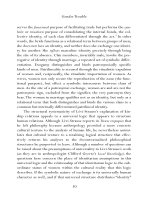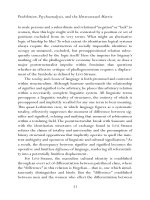GENDER TROUBLE 113
Bạn đang xem bản rút gọn của tài liệu. Xem và tải ngay bản đầy đủ của tài liệu tại đây (20.3 KB, 1 trang )
Gender Trouble
within Freud’s thesis of primary bisexuality, there is no homosexuality,
and only opposites attract.
But what is the proof Freud gives us for the existence of such
dispositions? If there is no way to distinguish between the femininity
acquired through internalizations and that which is strictly dispositional,
then what is to preclude the conclusion that all gender-specific affinities
are the consequence of internalizations? On what basis are dispositional
sexualities and identities ascribed to individuals, and what meaning can
we give to “femininity” and “masculinity” at the outset? Taking the problematic of internalization as a point of departure, let us consider the status of internalized identifications in the formation of gender and,
secondarily, the relation between an internalized gender affinity and the
self-punishing melancholia of internalized identifications.
In “Mourning and Melancholia,” Freud interprets the self-critical
attitudes of the melancholic to be the result of the internalization of a
lost object of love. Precisely because that object is lost, even though
the relationship remains ambivalent and unresolved, the object is
“brought inside” the ego where the quarrel magically resumes as an
interior dialogue between two parts of the psyche. In “Mourning and
Melancholia,” the lost object is set up within the ego as a critical voice
or agency, and the anger originally felt for the object is reversed so that
the internalized object now berates the ego:
If one listens patiently to the many and various self-accusations of the
melancholic, one cannot in the end avoid the impression that often
the most violent of them are hardly applicable to the patient himself,
but that with insignificant modifications they do fit someone else,
some person whom the patient loves, has loved or ought to love. . . .
the self-reproaches are reproaches against a loved object which have
been shifted onto the patient’s own ego. (169)
The melancholic refuses the loss of the object, and internalization
becomes a strategy of magically resuscitating the lost object, not only
78









